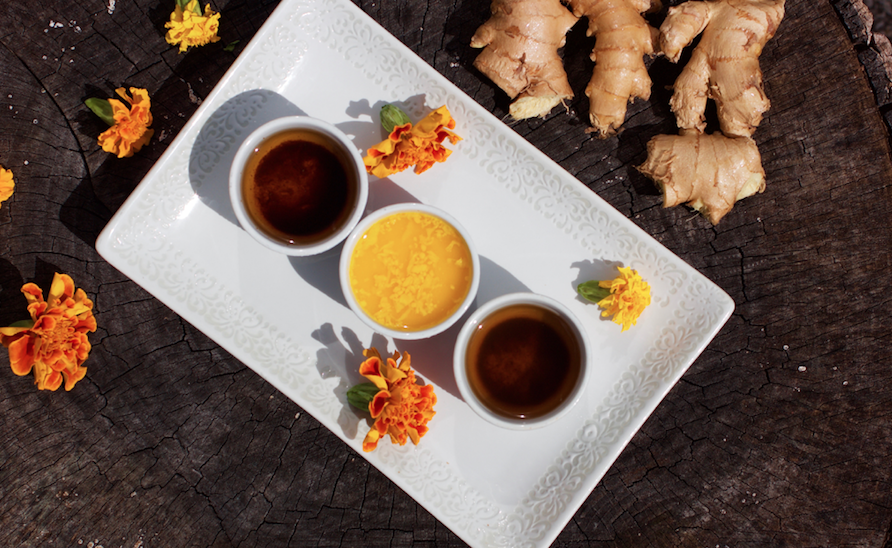Reconnecting with Mother Earth
Just a Spoonful of Herbal Remedies
In an awakening world, there’s a surge of desire—a longing to return to Mother Earth for healing and medicine. Herbal medicine is widely accepted as modern society grasps its worth for preventing and treating disease, and creating whole health.
What’s old is new again as Americans reconnect with Mother Earth seeking to renew, revitalize and restore their bodies, minds and souls, rather than turning to pharmaceutical drugs that advertise dire side effects. Orthomolecular Medicine News Service reported that “Americans take more than 60 billion doses of nutritional herbal (botanical) supplements annually with zero related deaths.”
Since man first stood upright, Mother Earth has generously provided us with organic natural remedies. Often dismissed as quackery, herbal remedies are deeply rooted in medical history. Since time immemorial, herbal medicine has been used by many diverse cultures throughout the world to treat illness and assist physiological functions. As early as 3000 BC, ancient Chinese and Egyptian writings describe medicinal uses for plants. Ancient doctors methodically collected information about herbs and developed distinct pharmacopoeias (written protocols) to treat a variety of ailments.
Today, nearly a quarter of pharma drugs are derived from plants and nearly 80% of the world uses botanicals for some aspect of primary health care. America, not so much, but that’s changing. From mint to marijuana, there are hundreds of botanicals that serve many vital medicinal and health purposes. Potent medical plants you’re likely to find in the wilderness of your backyard can be used for anti-inflammatory, anti-fungal, anti-cancer, insect repellent, antiseptic, expectorant, antibacterial, detoxifying, fever reduction or antihistamine purposes.
In the United States, more than 1,500 botanicals are sold as dietary supplements; top-selling plants include echinacea, lavender, frankincense, turmeric, peppermint, garlic, goldenseal, ginseng, Reishi and Maitake mushrooms, ginkgo, saw palmetto, aloe, valerian, green tea, ephedra, Siberian ginseng, marigolds and cranberry. Herbal remedies in the form of extracts, tinctures, capsules, tablets and teas address a constellation of maladies such as allergies, cancer, inflammation, asthma, eczema, premenstrual syndrome, rheumatoid arthritis, fibromyalgia, migraine, menopausal symptoms, chronic fatigue, irritable bowel syndrome and cancer.
Herbal tinctures, elixirs and essential oils use plant seeds, berries, roots, bark or flowers. While herbal medicine is not a licensed profession in the U.S., herbal remedies in the form of extracts, tinctures, capsules, teas and tablets may be recommended by health care practitioners of various disciplines as a gentler, more natural way to address a wide variety of largely preventable medical conditions.
For example, marigold or calendula has been employed medicinally for centuries to treat conjunctivitis, blepharitis, eczema, gastritis, minor burns including sunburns, warts and minor injuries such as sprains and wounds, cramps, coughs and snake bites. Calendula’s high content of flavonoids act as antioxidants known to protect cells from damage caused by oxidation. Oxidation produces oxygen free radicals, which are natural chemicals that may suppress immune function. Calming chamomile tea treats anxiety, cramping and muscle pain. Echinacea, from the coneflower, was used centuries ago by Native Americans; today many take echinacea to help fight off colds as it has been touted to boost immune response. Ginkgo, or ginkgo biloba, improves circulation and brain activity. Ginseng has been used for thousands of years as a natural energy boost, St. John’s Wort as an herbal alternative to prescription medications for relieving anxiety and depression.
Elixirs, crafted with a bit more presence, differ from smoothies. The herbal elixirs created in the raw living food and longevity lifestyle community involve multiple steps and an intention behind them such as supporting the immune system, building stronger bones, speed-bumping the aging process, encouraging hair and nail growth or keeping hair from losing its color.
Most tinctures are percolated or macerated. Generated thousands of years ago, liquid extracts are still a favorite naturopathic medicine today. Steeping the fresh or dried herb in a solution of food-grade alcohol before straining makes tinctures. The alcohol extracts both the oil- and water-based medicinal properties. The benefits of tinctures over other forms of herbal medicine are that they are concentrated, easy to dispense, easy to take, rapidly absorbed, easy on the tummy and have a very long shelf life. Tinctures can be added to juices, elixirs, water, smoothies and teas and can vary in doses depending on the herb and health concern.
Looking for a local taste of what Mother Earth has to offer?
Indianapolis’ Georgetown Market offers wheat grass shooters with a juice chaser and a lemon-ginger-turmeric elixir when you feel a cold coming on.
Can’t sleep? Make a sleep elixir using eight ounces hot water and dried chamomile flowers to fill one sachet and a ½-inch knob of crushed fresh ginger.
Need to detox your quivering liver? Try eight ounces hot water, ⅛ teaspoon turmeric and juice of half a lemon.
Ezra’s Enlightened Café also offers potent shooters of turmeric and ginger juice and a variety of herbal elixir beverages and shots.
Insecure regarding a particular herb being used in extracts or tinctures and have questions? Ask a professional or inquire at your locally owned whole-foods grocery and vitamin professionals like Good Earth Natural Foods, Georgetown Market and Nature’s Pharm.
Incorporating herbal tinctures into your lifestyle is easy, as natural as breathing, safe, fast-acting and gentle on your delicate ecosystem. The heavenly bounty from Mother Earth’s celestial apothecary was created to sustain humanity. Now is the perfect time to return and reconnect to the verdant garden we ought to have never forsaken.
This article is for informational purposes only and should not be considered medical advice. Always consult with a medical professional before starting a new health regimen.







